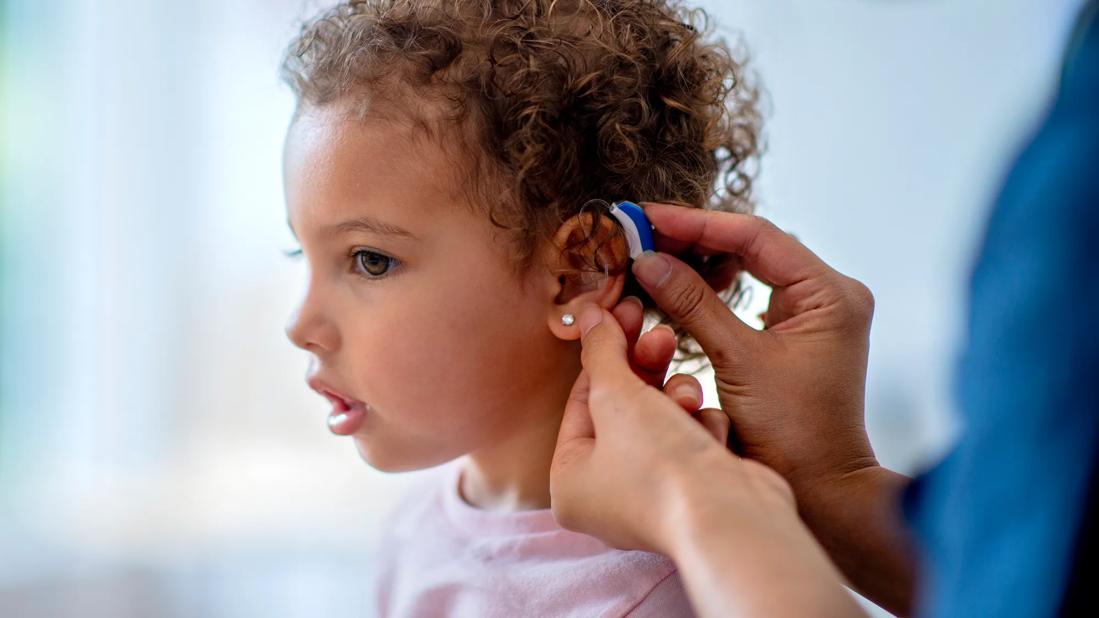Untreated hearing loss can affect kids’ speech and language development and their overall quality of life

Image content: This image is available to view online.
View image online (https://assets.clevelandclinic.org/transform/7f38d4dd-805b-4c55-b05c-d7011028021d/child-hearing-aid-2160289598-r)
Child being fitted with a hearing aid
As parents and caregivers, we sometimes joke about “selective hearing” in our kids. But what do you do if you suspect they really might not be hearing you?
Advertisement
Cleveland Clinic is a non-profit academic medical center. Advertising on our site helps support our mission. We do not endorse non-Cleveland Clinic products or services. Policy
“If left untreated, hearing loss can seriously impact their speech, language development, education and overall cognitive skills,” says pediatric otolaryngologist Samantha Anne, MD, “so, it’s important to let your doctor know if you suspect any difficulty with your child’s hearing.”
Dr. Anne offers insight into what might cause your child’s hearing loss and options for treatment.
As with any health issue, there’s a lot of nuance around hearing loss, which means a lot of possibilities when it comes to types, causes and treatments. Everyone is different … and everyone’s ears, are too!
Issues of hearing loss in kids can be:
Let’s take a look at some of the most common causes.
Temporary hearing loss typically resolves within a few months. Possible causes include:
Advertisement
Several issues can cause permanent hearing loss:
Does any of this sound familiar? Your child:
These signs could all point to the same issue — hearing loss. And while you might think your child is too young to be treated for hearing loss. But when it comes to hearing, there’s no such thing as “too young.”
About 1 to 2 in 1,000 babies are born with some type of hearing loss. But studies have found that when kids are diagnosed with hearing loss at birth and begin receiving intervention and support as early as 3 to 6 months old, they often develop language skills that are equal to those of their hearing peers.
In the U.S., newborn babies are given a hearing screening right after birth to confirm they can hear. Your child will also likely have hearing screenings done at preschool and/or elementary school and during well-checks with their pediatrician.
But if you suspect your child has hearing problems, you can ask their pediatrician for a hearing screening at any time. In fact, Dr. Anne says that it’s important to investigate as soon as you start to have concerns.
“The earlier we can improve a child’s hearing, the better they do and the faster they catch up to their peers, in terms of speech and language development,” she points out. “Finding out about hearing loss early and understanding what might be causing it can help us give you a better idea of what to expect and how to best provide support to your family.”
Advertisement
Your child’s pediatrician can refer you to specialists to start the evaluation process and have them tested to figure out the cause of their hearing issues. This will likely include an audiologist, a healthcare provider who specializes in diagnosing and treating hearing disorders, and an otolaryngologist (ENT), who specializes in conditions that affect the head and neck.
Hearing tests for kids may include:
“If you’re concerned about hearing loss in your child, have them evaluated ASAP,” Dr. Anne reiterates. “There should be no reason that hearing should be the cause of a child not reaching their potential.”
If your child is diagnosed with hearing loss, what comes next? “Knowing about the different treatment options can help us choose the best approach to manage your care and get the best possible results,” Dr. Anne says.
Advertisement
Here are a few options for treating hearing loss in kids:
Advertisement
Bottom line? If you think your child may have a hearing problem, make an appointment with your pediatrician. Again, it’s always better to find out sooner rather than later.
“Hearing loss is something we can easily address to improve your child’s quality of life and help them meet their developmental milestones,” Dr. Anne reassures. “We’ll do everything we can to get your child where they need to be and not let hearing loss hold them back.”

Sign up for our Health Essentials emails for expert guidance on nutrition, fitness, sleep, skin care and more.
Learn more about our editorial process.
Advertisement
Sudden hearing loss can have many causes — but it’s important to seek treatment fast
Hearing aids can be enough for some people, but other devices — like for your phone, TV and fire alarm — can help, too
Reduce background noise, don’t talk too fast or too slow and above all, ask what’s most helpful to them
Ringing is already a sign of damage, but you can take steps to keep your hearing protected
Keeping your brain healthy is key
Learn how to help encourage a better quality of life
Damage accumulates over time
Most teething symptoms are mild — fevers and other major symptoms are likely something else
Prioritize your health by managing stress, strengthening your social connections and getting quality sleep
Bolsters, blankets, pillows and blocks can offer extra support, stability and comfort
Allergies, postnasal drip, asthma or reflux could be to blame for a cough that won’t quit